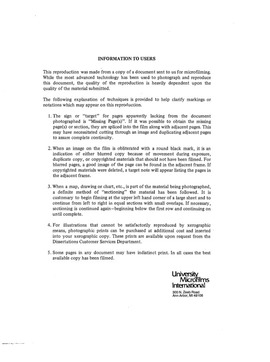| dc.contributor.author | Hampton, Carol Mcdonald, | en_US |
| dc.date.accessioned | 2013-08-16T12:29:19Z | |
| dc.date.available | 2013-08-16T12:29:19Z | |
| dc.date.issued | 1984 | en_US |
| dc.identifier.uri | https://hdl.handle.net/11244/5314 | |
| dc.description.abstract | From the Spanish Edict of 1620 prohibiting the usage of peyote to current state narcotics laws classifying peyote as a narcotic American Indians have withstood harassment, confiscations, imprisonment, and defamations of their spiritual beliefs and practices. Hostility and antagonism from non-Indians has spread over all Indian religions, pan-Indian religious movements as well as individual tribal practices. Federal Indian agents, temperance leaders, state, county, and district officials, local groups have disrupted and prohibited American Indian religious ceremonies with or without the benefit of law. Opposition has often taken the form of a forced assimilation--a forced acceptance of the dominant society's culture and beliefs. Promoters of assimilation of Indians into Euro-American society have lobbied federal and state legislatures to prohibit all evidence of Indian spirituality. | en_US |
| dc.description.abstract | With a two-pronged philosophical base set in sixteenth century European theories regarding the rights of conquered peoples and in a belief that Christianity is the only true religion, Euro-Americans have righteously attacked all evidence of differences from their own customs. Hostility to that which is different or alien continues to the present day. | en_US |
| dc.description.abstract | This study seeks to affirm the legal rights of Indians to constitutional protection of their religious practices as well as to their beliefs. It also attempts to assess the sources of opposition to Native American spirituality and to determine a means by which American law might protect the religions of all American citizens. | en_US |
| dc.description.abstract | With a lengthy background dating from the Spanish conquest in 1521 to the present time, federal and state officials, Christian clergy and laity, and private organizations and individuals have challenged the veracity, validity and viability of American Indian religions. Much of that opposition has centered on apparent and obvious aspects of religious practices and belief, in particular, the usage of peyote as a sacrament in spiritual worship. | en_US |
| dc.description.abstract | The passage of the American Indian Religious Freedom Act in 1978 documented examples of antagonism as well as simple ignorance which has limited American Indian spiritual practices. Legal actions since 1978 suggest that the American Indian Religious Freedom Act can offer no guarantee of cessation of this religious oppression. | en_US |
| dc.format.extent | viii, 265 leaves : | en_US |
| dc.publisher | The University of Oklahoma. | en_US |
| dc.subject | Peyotism. | en_US |
| dc.subject | Indians of North America Religion. | en_US |
| dc.subject | History, United States. | en_US |
| dc.title | American Indian religion under assault : | en_US |
| dc.type | Thesis | en_US |
| dc.thesis.degree | Ph.D. | en_US |
| dc.note | Source: Dissertation Abstracts International, Volume: 46-01, Section: A, page: 0245. | en_US |
| ou.identifier | (UMI)AAI8505907 | en_US |
| ou.group | Other | |
